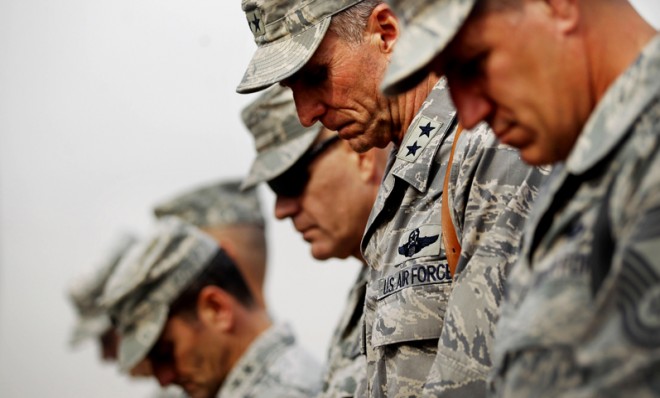The cost of the Iraq war: 190,000 lives, $2.2 trillion
The U.S. invaded Iraq 10 years ago this week. Was it worth it?

A free daily email with the biggest news stories of the day – and the best features from TheWeek.com
You are now subscribed
Your newsletter sign-up was successful
Tuesday marks the 10-year anniversary of the Iraq war. The cost of that military adventure? Approximately 190,000 dead soldiers, contractors, and civilians, and a $2.2 trillion bill for American taxpayers, according to a recent report from Brown University. Specifically, the research was conducted by "30 economists, anthropologists, lawyers, humanitarian personnel, and political scientists from 15 universities, the United Nations, and other organizations."
The initial cost estimate by the U.S. Office of Management and Budget in 2002: $60 billion. As we previously reported, that's the amount the United States ended up spending on reconstruction efforts alone, with $8 billion of it being wasted outright. The $2.2 trillion number cited by Brown includes the cost of caring for veterans, and could climb to $3.9 trillion by 2053 thanks to cumulative interest on borrowed funds.
As for the 190,000 dead: Roughly 134,000 of them were Iraqi civilians.
The Week
Escape your echo chamber. Get the facts behind the news, plus analysis from multiple perspectives.

Sign up for The Week's Free Newsletters
From our morning news briefing to a weekly Good News Newsletter, get the best of The Week delivered directly to your inbox.
From our morning news briefing to a weekly Good News Newsletter, get the best of The Week delivered directly to your inbox.
Obviously, those numbers are pretty staggering. And they raise an obvious question: Was it worth it? Not according to the researchers. Reuters sums up the findings:
The report concluded the United States gained little from the war while Iraq was traumatized by it. The war reinvigorated radical Islamist militants in the region, set back women’s rights, and weakened an already precarious healthcare system, the report said. [Reuters]
Particularly alarming, the report says, is the lack of access to healthcare after "more than half of Iraq’s medical doctors left the country during the 2000s."
Of course, plenty of people see the Iraq war as something of a success, albeit a costly one. And certainly, in the bloody days before the successful surge and Sunni awakening, it seemed that Iraq might never achieve the relative stability and fragile peace it has today. And, as Victoria Nuland, spokesperson for the U.S. State Department, notes, U.S.-Iraq ties have at least improved.
Compared to where we were in the Saddam era, we now have a bilateral security agreement. We have deep economic interests and ties. We have a security relationship. We have a political relationship. [Stars and Stripes]
Of course, Saddam Hussein had few admirers. But did the United States really achieve its goal of making Iraq a free and democratic country? Not really, says the report. Iraq ranks 112th out of 165 countries in the Economist Intelligence Unit's Democracy Index — classified somewhere between a "flawed democracy" and an "authoritarian regime."
A free daily email with the biggest news stories of the day – and the best features from TheWeek.com
And while things are better today than they were in, say, 2006, it's not like today's Iraq is violence-free. The same morning that the new figures were released, Reuters reported that coordinated blasts killed 25 people near the Green Zone in Baghdad.
Keith Wagstaff is a staff writer at TheWeek.com covering politics and current events. He has previously written for such publications as TIME, Details, VICE, and the Village Voice.
-
 How the FCC’s ‘equal time’ rule works
How the FCC’s ‘equal time’ rule worksIn the Spotlight The law is at the heart of the Colbert-CBS conflict
-
 What is the endgame in the DHS shutdown?
What is the endgame in the DHS shutdown?Today’s Big Question Democrats want to rein in ICE’s immigration crackdown
-
 ‘Poor time management isn’t just an inconvenience’
‘Poor time management isn’t just an inconvenience’Instant Opinion Opinion, comment and editorials of the day